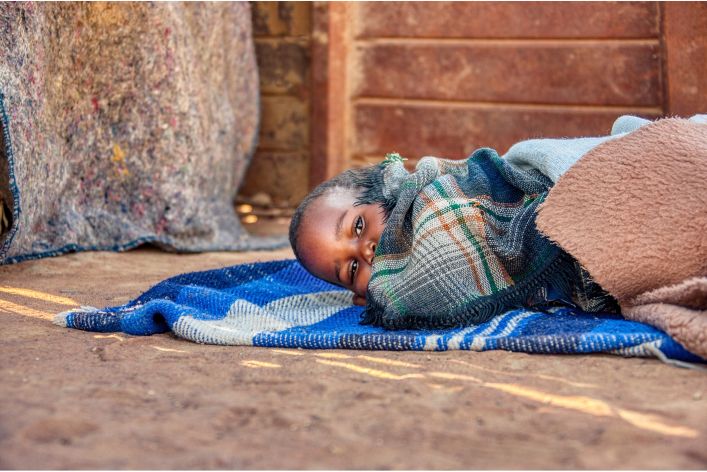Introduction
Child health is an important aspect of any country’s development, and Nigeria is no exception. The Nigerian government has been working towards reducing the morbidity and mortality rates of children in the country. Common child health issues in Nigeria include malnutrition, malaria, diarrhea, and respiratory tract infections.
Malnutrition is a significant cause of morbidity and mortality in Nigerian children. It is caused by poor dietary intake or absorption of nutrients. Malaria is another leading cause of death in Nigerian children, with over 100,000 deaths annually. Diarrhea and respiratory tract infections are other common health issues affecting Nigerian children.
Addressing these common child health issues in Nigeria requires a multifaceted approach. The Nigerian government has made efforts to improve nutrition in the country, such as implementing programs to distribute vitamin A supplements and encouraging exclusive breastfeeding.
To combat malaria, the government has distributed insecticide-treated mosquito nets and antimalarial drugs in endemic areas.
Hand-washing is encouraged to prevent diarrhea, and immunization programs have been established to prevent respiratory tract infections.
All in all, addressing common child health issues in Nigeria is crucial to the country’s development. The health and well-being of children are essential for the growth and prosperity of any nation.
It is imperative to continue working on solutions to prevent and treat these health issues for the betterment of Nigerian children and the country as a whole.
Malnutrition
Malnutrition is a major issue in Nigeria, with around 37% of children under the age of five suffering from stunting. Here are the causes and consequences of malnutrition in children, as well as some solutions to combat this problem.
Causes and Consequences of Malnutrition in Children
- Poor maternal nutrition during pregnancy
- Infant feeding practices, such as not breastfeeding exclusively for the first six months
- Problems with access to diverse and nutritious foods
- Infectious diseases such as diarrhea diseases and malaria
These factors contribute to malnutrition and can lead to a number of negative consequences. Malnourished children are more likely to suffer from infectious diseases and are less likely to reach their full potential in terms of physical and cognitive development.
Solutions to Malnutrition
There are a number of strategies to address malnutrition in Nigerian children, including:
- Improved breastfeeding practices: Mothers should be encouraged to breastfeed exclusively for the first six months and continue breastfeeding alongside solid foods until the age of two or longer if possible.
- Dietary changes: Children should have access to a diverse range of nutritious foods, including fruits, vegetables, and proteins.
- Nutritional supplements: In some cases, children may require additional vitamins and minerals to meet their nutritional needs.
All of these strategies can help to improve the nutritional status of children and reduce the prevalence of malnutrition.
The Role of Community-Based Interventions in Fighting Malnutrition
Community-based interventions can be highly effective in addressing malnutrition in Nigerian children. These interventions involve working with families and communities to promote improved health and nutrition practices.
One such intervention is the Community Infant and Young Child Feeding (C-IYCF) program. This program trains community health workers to deliver key messages about nutrition and health to mothers and caregivers. It also provides support for breastfeeding and complementary feeding practices, as well as referrals for malnourished children.
Another community-based intervention is the use of women’s groups. These groups provide a forum for women to discuss health and nutrition issues, share experiences, and receive support. Women’s groups can be particularly effective in promoting exclusive breastfeeding and complementary feeding practices.
In general, malnutrition is a major health issue in Nigeria, but there are a number of strategies that can be employed to combat this problem. These include promoting improved breastfeeding and complementary feeding practices, improving access to diverse and nutritious foods, and utilizing community-based interventions.
By working together, we can improve the health and well-being of Nigerian children and reduce the prevalence of malnutrition.
Parenting Made Just for You
Get personalized Parenting Solutions tailored to your child’s needs. Transform your parenting journey with expert guidance in 1-3 days.
Get StartedRead: Safeguarding Child Health with Clean Water & Sanitation
Malaria
Malaria is a life-threatening disease caused by parasites transmitted to people through the bites of infected female Anopheles mosquitoes.
According to the World Health Organization, Nigeria has the highest burden of malaria cases globally, accounting for 27% of global malaria cases in 2019. Malaria has a severe impact on child health, contributing to about 11% of under-five mortality in Nigeria.
Prevention Strategies
- Use of insecticide-treated bed nets, which reduce the number of infective mosquito bites that occur at night when children are asleep.
- Intermittent preventive treatment (IPT), which involves administering antimalarial medication to children on a regular basis.
- Indoor residual spraying, which involves spraying insecticides on the walls and interior surfaces of houses to kill mosquitoes.
These prevention strategies have proven to be effective in reducing the incidence of malaria in Nigeria.
Treatment of Malaria in Children
Prompt diagnosis and effective treatment of malaria in children is crucial to reducing the mortality rate. Symptoms of malaria in children include fever, headache, vomiting, and jaundice.
The first-line treatment for uncomplicated malaria in Nigeria is artemisinin-based combination therapy (ACT), which is highly effective in clearing the parasites from the bloodstream. Parents and caregivers should seek prompt medical attention for their children if they suspect malaria.
Severe malaria is a medical emergency that requires immediate treatment in a facility with experienced staff and adequate equipment. Children with severe malaria may require blood transfusions, anticonvulsants, or other interventions to manage complications such as cerebral malaria, respiratory distress, or severe anemia.
Malaria remains a significant health challenge in Nigeria, with children being the most affected. Preventive measures such as the use of insecticide-treated bed nets, indoor residual spraying, and IPT have been shown to be effective in reducing the incidence of malaria.
Early diagnosis and prompt treatment with effective antimalarial drugs are crucial to reducing the mortality rate.
Read: How to Manage Picky Eating Among Nigerian Children

Immunization
- Immunization is crucial in preventing childhood illnesses.
- Common childhood illnesses that can be prevented through immunization include polio, measles, and diphtheria.
- Barriers to immunization coverage in Nigeria include lack of awareness, inadequate vaccine supply, and high cost.
- Strategies for improving vaccination rates include expanding access to vaccines, increasing vaccine demand through education, and strengthening the vaccine supply chain.
Immunization is one of the most effective ways to reduce child morbidity and mortality caused by vaccine-preventable diseases. It involves the administration of a vaccine to stimulate the immune system’s production of antibodies and build immunity against specific diseases. Immunization not only protects the individual child but also creates herd immunity, making it hard for the disease to spread in the community.
Prevention of Common Childhood Illnesses Through Immunization
Common childhood illnesses that can be prevented through immunization include polio, measles, diphtheria, tetanus, hepatitis B, and tuberculosis.
These diseases are still prevalent in Nigeria and can cause severe illness, disability, and death. By vaccinating children against these diseases, we can reduce child mortality and morbidity and promote healthy communities.
Barriers to Immunization Coverage in Nigeria and Strategies for Improving Vaccination Rates
Despite the benefits of immunization, Nigeria still faces some barriers to vaccine coverage. These include a lack of awareness among caregivers about the importance of vaccination, inadequate vaccine supply, inadequate vaccine distribution systems, and high cost.
Unveil the Perfect Name that Tells Your Family's Story
Let us help you find a name that embodies your family's values, traditions, and dreams. Our personalized consultation weaves cultural insights to create a name that's uniquely yours.
Get StartedTo improve vaccination rates, we need to address these barriers through various strategies.
One strategy for improving immunization coverage is expanding access to vaccines. We can achieve this by establishing more vaccination posts, mobile clinics, and outreach programs to reach children in underserved areas. Also, we can reduce the inequity in vaccine access by providing free or subsidized vaccines to low-income families.
Another strategy is to increase vaccine demand through education. We can educate caregivers about the importance of immunization, the benefits of each vaccine, and the vaccination schedule. This will help to dispel myths and misconceptions about vaccines and increase the willingness of caregivers to vaccinate their children.
Also, we can engage community leaders, religious leaders, and social media influencers to promote vaccination and debunk anti-vaccine propaganda.
Finally, strengthening the vaccine supply chain is crucial to ensuring a steady, reliable supply of vaccines. Nigeria can achieve this by improving vaccine storage and distribution systems, using technology to monitor vaccine stock levels, and training health workers on cold chain management.
Also, we can strengthen vaccine financing and procurement systems to ensure a sustainable supply of vaccines.
In summary, immunization is an essential tool for improving child health and reducing child mortality in Nigeria. Despite the challenges, we must continue to prioritize and invest in immunization programs to ensure that every child has access to life-saving vaccines.
Read: Balanced Diet for Kids: Nigerian Meals Edition
Diarrhea Diseases
Diarrhea diseases are one of the most common health issues affecting children in Nigeria. It is a leading cause of mortality and morbidity among children under the age of five. Diarrhea can be caused by viral, bacterial, or parasitic infections, poor sanitation, and contaminated food and water.
The consequences of diarrhea can be severe, especially in children who are malnourished and have weakened immune systems. It can lead to dehydration, malnutrition, and even death if left untreated. The symptoms of diarrhea include frequent loose stools, abdominal pain, cramps, fever, and loss of appetite.
Preventing Diarrhea Diseases
Preventing diarrhea diseases requires a multi-faceted approach that involves promoting good hygiene and sanitation practices, safe drinking water, and appropriate management of food.
The following are some effective strategies for preventing and treating diarrhea in children:
- Hand washing: Promoting the importance of hand washing with soap and clean water is the most effective way to prevent diarrhea diseases in young children. Encouraging proper handwashing practices before eating, after using the toilet, and after playing in dirty areas can significantly reduce the risk of diarrhea diseases.
- Safe Water and Sanitation Practices: Access to safe drinking water and proper sanitation facilities is essential in preventing diarrhea diseases. Ensuring that water sources are free of contamination and setting up proper sanitation facilities can help reduce the spread of diarrhea diseases.
- Oral Rehydration Therapy: Oral Rehydration Therapy (ORT) is a simple but effective way to treat dehydration caused by diarrhea. It involves drinking oral rehydration salt (ORS) solution, which contains a precise balance of salt, sugar, and water. ORT can be administered at home and can prevent the need for hospitalization.
Role of Community-based Interventions
Community-based interventions can play a critical role in preventing and treating diarrhea diseases in children. These interventions can include teaching community members about good hygiene practices, providing ORS solution and zinc supplements at the community level, and empowering women to become health workers.
In essence, preventing diarrhea diseases in children requires a multi-faceted approach that involves promoting good hygiene and sanitation practices, safe drinking water, and appropriate management of food.
By utilizing community-based interventions and encouraging individual behavior change, we can make significant progress in reducing the incidence of diarrhea diseases in Nigeria.
Read: Optimizing the Immunity of Your Child Through Nutrition
Conclusion
Common child health issues in Nigeria such as malnutrition, malaria, pneumonia, and diarrhea can be addressed through various solutions such as improving access to proper nutrition, increasing vaccination coverage, using insecticide-treated nets, and promoting handwashing and hygiene practices.
It is critical that stakeholders prioritize child health in Nigeria by investing in healthcare infrastructure, improving healthcare delivery systems, and increasing financial resources. Parents and caregivers must also take an active role in ensuring that their children receive the necessary care and treatment to prevent and treat illnesses.
Addressing child health issues can have a significant impact on the overall health and development of the nation. By ensuring that children are healthy and well-nourished, they are more likely to perform well in school, reach their full potential, and contribute to the growth and development of the country.
We, therefore, call upon all stakeholders to make child health a priority in Nigeria and work towards creating a healthier and brighter future for our children.




